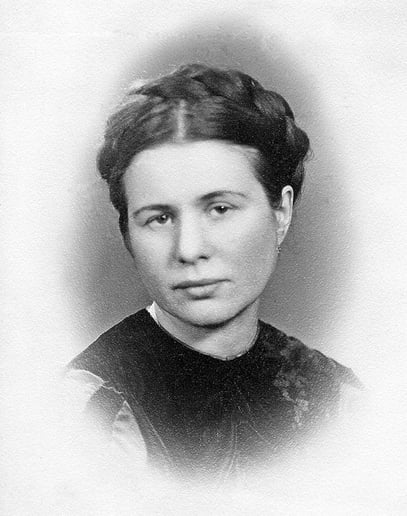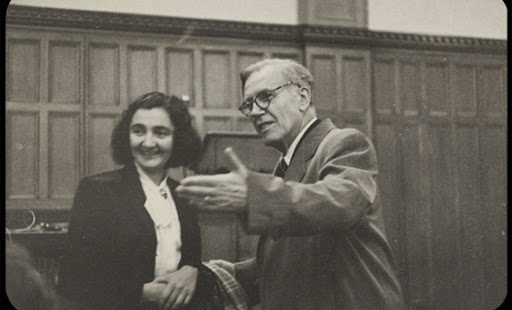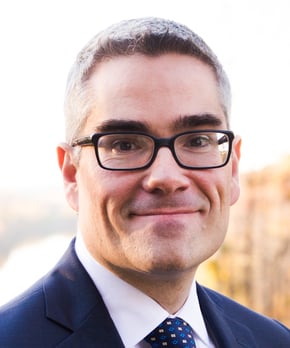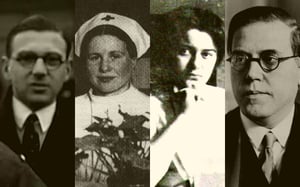As Hitler and Nazism rose to power, millions of people resisted in many different ways. Some were well-known for their objection; prudence dictated that others remained clandestine. Some fought Nazism with the weapons of war; others fought back with the pen. Some landed on beaches of foreign lands; some never left their towns.
Though most of the resisters never met, they formed a beautiful coalition of truth and love. While we must always remember the terrible atrocities of these times, we must also remember these men and women who fought back.
Earlier this month, we told the story of St. Maximilian Kolbe, who heroically gave his life for another at Auschwitz. Three more men and women seem apropos for our time. Each of them can courageously guide us going forward as our world slouches toward error and hatred.
Sir Nicholas Winton
In 1938, Hitler sent troops to Czechoslovakia in an effort to annex the country for Germany. Seeing the Nazi troops come over their borders and knowing what was coming next, thousands of Jews poured into Prague in a frantic attempt to get their children to safety in other countries. But that effort proved difficult for various reasons, including the fact that other countries were either reluctant to take them—or refused outright.
Seeing the news stories and the pictures of refugee camps with tens of thousands of children suffering in the cold Prague winter, a London stockbroker named Nicholas Winton decided to go to Prague to see how he could help. Winton rented a hotel in Prague and set up an ad hoc organization with the goal of getting the children to safety. Word of Winton’s activities quickly got out and Winton met with many parents in his makeshift office.
Winton traveled back to London with the names and pictures of these children to petition the British government for their immigration. Largely unmoved at first, Winton continued to petition the government. The British government eventually relented and Winton saved 669 children—many of whom would have surely died as victims of Nazi persecution.
For fifty years, Winton kept silent about his life-saving exploits, telling almost no one—even his wife. One day when cleaning the attic, Winton’s wife came across his records of these children, and was both shocked and fascinated. His wife went to British reporters to tell the story, and although some were curiously uncurious about this story, one journalist was fascinated and took the story public.
Soon, these children learned about the man who had saved them. In 1988, the BBC did a program called “That’s Life” in which they invited Winton, who was left in the dark as to what the program was about. Also unknown to him was the fact that these children (who now had children and grandchildren of their own) were also invited. This all made for a rather dramatic scene:
Winton was knighted by the Queen in 2002 in recognition of his life-saving efforts. People might say of Winton that—in saving so many lives—he cheated death. And they would speak truly—a reality underscored by the fact that Winton lived to the age of 106.
Irena Sendler
A lifelong Catholic, Irena Sendler was a social worker and a member of the Polish Underground Resistance. Sendler set herself to the task of saving as many Jewish children as she could from the Warsaw ghetto. In an effort to do so, she smuggled out children under the noses of the Nazis by almost any conceivable means, including tool boxes, coffins, and bags. Once outside the ghetto, she worked tirelessly to find homes and convents in which to hide the children.
Eventually, Sendler was arrested by the Gestapo but refused to disclose any information about the children to her captors—even under three months of imprisonment, torture that broke her arms and legs, and a death sentence. She simply would not speak, later saying, “I kept silent. I preferred to die than to reveal our activity.” On the day she was scheduled to be killed by the Nazis, she was set free after a member of the Polish resistance bribed a Gestapo agent responsible for overseeing her execution.
 Irena Sendler / Public Domain
Irena Sendler / Public Domain
Sendler is credited with saving 2,500 Jewish children—twice as many human beings as the heroic Oscar Schindler. Although she received numerous honors and tributes after the war, Sendler’s story—similar to Winton’s—was essentially unknown for decades until a group of high school students in America researched her story and wrote a play about her life. Also similar to Winton was Sendler’s longevity, as she lived to be 98 years old.
Sendler’s life is a reminder that, against evil, the greatest resistance is love.
Edith Stein
Edith Stein was born into a Jewish family in modern-day Poland in 1891. Stein became an atheist in her early teen years, but became Catholic in her early thirties, largely as a result of reading the autobiography of Saint Teresa of Avila.
Given the illustrious intellectual history of the Catholic Church, one is cautious to rank someone as one of the greatest minds in ecclesiastical history, but how else could we rank Edith Stein? She was a superlative genius who had to overcome both racism and sexism to advance—but advance, she did. As the Stanford Encyclopedia of Philosophy puts it,
“The publication of the 27-volume “Edith Stein Gesamtausgabe” has confirmed Stein as an independent, creative, and highly productive philosopher, who made original contributions on such diverse topics as personhood and the apprehension of others in empathy, collective intentionality and shared experiences, emotions and values, the nature of the state, the education of women and women’s rights and the nature of being and essence.”
That is a powerful endorsement, indeed, but perhaps it says more about Stein as a person that she chose to write her doctoral dissertation on the topic of “empathy.” Empathy was certainly close to her heart as she, taking the name Teresa Benedicta of the Cross, became a Carmelite nun in 1934.
.jpg?width=413&height=469&name=Edith_Stein_(ca._1938-1939).jpg) A picture of Edith Stein taken for her passport (ca. December 1938-1939) before moving to Echt, Netherlands. / Public Domain
A picture of Edith Stein taken for her passport (ca. December 1938-1939) before moving to Echt, Netherlands. / Public Domain
Four years later, because she was of Jewish descent, Sister Teresa’s order moved her to Holland in an effort to protect her. In 1942, the Nazis in Holland violently seized all the Jews to be deported. She was seized by the Nazis and transported to Auschwitz, where she was sent to the gas chamber only two days later.
Sister Teresa could have pleaded that she was a Catholic by baptism, but she chose to suffer with her people. In his canonization homily, Pope John Paul II recounted her time before she was seized by the Nazis. He said,
“A few days before her deportation, the woman religious had dismissed the question about a possible rescue: ‘Do not do it! Why should I be spared? Is it not right that I should gain no advantage from my Baptism? If I cannot share the lot of my brothers and sisters, my life, in a certain sense, is destroyed.’”
Teresa had studied empathy for much of her life, but it was in her final days that she taught us the greatest lesson of empathy.
Dietrich von Hildebrand
Considering the Luciferian personality of Hitler and the abject evil that is Nazism, it is a badge of honor that Dietrich von Hildebrand was considered one of the Nazis’ greatest enemies. Von Hildebrand earned that badge, as he was one of earliest and most vociferous critics of National Socialism just as it was in its infancy. For that public criticism, in the 1920’s and reiterated again in the 1930’s after Hilter came to power, the Nazis issued a public death sentence on Hildebrand (that is, if they could find him). As Franz von Papen, the Nazi Ambassador to Austria put it, “That damned Hildebrand is the greatest obstacle for National Socialism in Austria. No one causes more harm.”
 Dietrich von Hildebrand / Public Domain
Dietrich von Hildebrand / Public Domain
Born in Florence, Italy in 1889 to a family that largely ignored religion, Dietrich von Hildebrand was graced by God with the gift of wonder and almost intuited the truth of the Catholic Faith. Entering the Catholic Church with his wife Margarete in 1914, Hildebrand was blessed with a towering genius for philosophy accompanied by a deep sensus fidei (sense of the faith). This proved a powerful combination against the lies of Nazism.
After von Hildebrand achieved a doctorate in philosophy at the University of Gottingen in Germany, he took a teaching position at the University of Munich. The Nazis, however, were less than happy with Hildebrand’s Catholic curriculum which condemned the lies and evils of Nazism.
The Nazis wanted him dead, but first, they had to find him. This proved no easy task. Hildebrand was always able to stay one step ahead of Hitler. Hildebrand fled Germany in 1923, escaping to Italy and then to Austria; then he fled to Switzerland, and then France, then on to Brazil—writing, teaching, learning philosophy and denouncing National Socialism at every stop. This undoubtedly infuriated Hitler, who—at some point—must have realized that he wasn’t chasing a Catholic philosophy professor. He was chasing a combination of Aristotle and Jason Bourne.
Eventually, Dietrich made his way to New York City in 1940, where he taught at Fordham for the next twenty years.
Dietrich von Hildebrand spent a great portion of his life condemning the various errors of Nazism, but at our very moment in America in 2020, one facet of his philosophy seems particularly applicable: his condemnation of nationalism. On that score, von Hildebrand highlighted the essential difference between patriotism and nationalism. In 1934, he wrote, “Genuine patriotism and nationalism are as different from each other as the true, divinely ordained love of self is from egoistic self-love.” Love for one’s nation is healthy and “well-ordered,” but nationalism is a “terrible error” indeed:
“What is nationalism? This terrible error exists in many degrees, starting with the identification of nation and state and reaching all the way to committing idolatry toward a nation, that is, making the nation the highest criterion for the whole of life and making it the ultimate goal and highest good.“. . . every person who refuses to grant other nations the right to develop freely, who holds that he can ignore their rights and justified wishes, and who imagines that he may trample them underfoot if it should be advantageous to his own country, thereby contradicts the very foundation that validates his love for his own country.” —Dietrich von Hildebrand, “My Battle Against Hitler”
This is such a valuable consideration for our own time, since the transcendental concepts of the true and good and beautiful have been rejected in favor of political expediency. But, to von Hildebrand’s point, if one is to truly love his nation, he must desire the true and good and beautiful for that nation. Nazism was a violent rejection of transcendental reality. But all who choose nationalism over patriotism would do well to remember that they are falling prey to a key error of Nazism itself.
Conclusion
In Saint Paul’s Letter to the Romans, we read,
“Do not be overcome by evil, but overcome evil with good.”
This verse serves as a short biography for those men and women we just discussed. Whether it comes in the form of the compassion and creativity of Nicholas Winton, the valor of Irena Sendler, the empathy of Edith Stein, or the outspoken brilliance of Dietrich von Hildebrand, all answered this call.
Thousands of others, including both those whom history has remembered and history has forgotten, answered that same call. So when we feel frustrated in our noblest of efforts, we need to remind ourselves and each other that we are united to these men and women, because—very simply—we have the same calling: to not be overcome with evil, but to overcome evil with good.
Interested to learn about more resisters to Naziism? Download a free ebook about a young Jewish boy named Hans Polk. Polk's foster parents took the courageous risk of caring for him during the Nazi occupation of WWII. Written by Polk himself, "Never Forget: The Story of a Holocaust Survivor" is a story of hope when all hope seems lost. Download your free copy below.


